Hidden within the narrow cobblestone streets of Lisbon lies a rich and captivating history that many travelers may not be aware of.
The Lisbon Fado History Cultural Walking Tour offers a unique opportunity to uncover the secrets behind Fado, a traditional Portuguese music genre that has deeply influenced the country’s culture.
As participants embark on this immersive journey, they will discover the origins of Fado, explore its lyrical evolution, and explore the neighborhoods of Lisbon where this enchanting art form thrives.
But that’s not all – there is much more to uncover on this unforgettable tour, leaving travelers eager to uncover the hidden gems of Lisbon’s Fado heritage.
This experience made our list of the 20 Best Historical Tours In Lisbon.
- Good To Know
- Origins of Fado
- Influences on Fado Music
- Evolution of Fado Lyrics
- Fado’s Cultural Significance
- Iconic Fado Artists and Venues
- Exploring Fado in Lisbon’s Neighborhoods
- Common Questions
- How Long Is the Lisbon Fado History Cultural Walking Tour?
- What Is the Maximum Group Size for the Tour?
- Are There Any Age Restrictions for the Tour?
- Are Food and Drinks Included in the Tour?
- Is There Any Specific Dress Code for the Tour?
- The Sum Up
- More Walking Tours in Lisbon
- More Tours in Lisbon
- More Tour Reviews in Lisbon
- Looking for something different? Other Lisbon activities we've written about
Good To Know
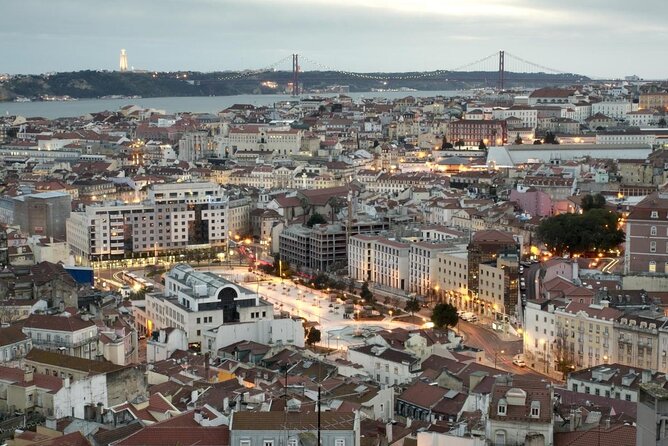
- Fado emerged in early 19th century Lisbon as a musical expression of the working class and maritime communities.
- Fado reflects the resilience and spirit of the Portuguese people, leaving a lasting impact on their identity.
- African music greatly influenced the rhythmic patterns and melodic structures of Fado.
- Fado lyrics have expanded to include a wider range of themes and have adapted to the changing times.
Origins of Fado
The origins of Fado can be traced back to the early 19th century in Lisbon, Portugal, where it emerged as a heartfelt and soulful musical expression of the city’s working class and maritime communities. Fado was greatly influenced by African music, particularly the rhythms and melodies brought to Portugal by African slaves. These influences gave Fado its distinct and haunting sound that resonated deeply with the Portuguese people.
As Fado gained popularity, it became an integral part of Portuguese identity, reflecting the struggles, joys, and sorrows of everyday life. The melancholic lyrics and passionate melodies of Fado captured the essence of the Portuguese spirit, and it continues to be cherished as a national treasure.
Fado’s impact on Portuguese identity can’t be overstated, as it remains a beloved and celebrated tradition that connects the past with the present, preserving the cultural heritage of the nation.
Interested in exploring Lisbon on foot? Other walking tours we've covered
Influences on Fado Music
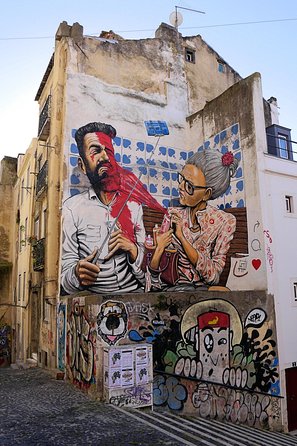
With its roots deeply embedded in the working class and maritime communities of 19th century Lisbon, Fado music was shaped by a diverse range of influences that contributed to its unique and haunting sound.
One of the major influences on Fado music was the African music brought by the African slaves who were brought to Portugal. This influence can be heard in the rhythmic patterns and melodic structures of Fado.
Another significant influence on Fado music was the Portuguese guitar, a traditional stringed instrument that became an essential component of the Fado ensemble. The melancholic melodies and emotional expression of the Portuguese guitar perfectly complemented the soulful vocals of Fado singers.
Today, contemporary Fado musicians continue to draw inspiration from these influences, while also incorporating modern elements to create a fresh and innovative sound that resonates with audiences around the world.
Evolution of Fado Lyrics
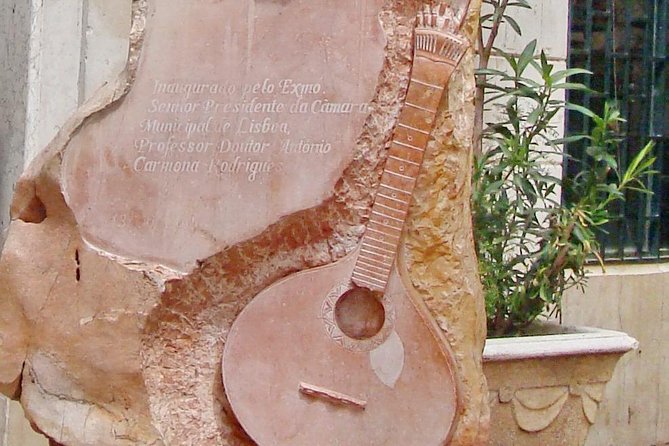
Throughout its history, Fado lyrics have undergone a fascinating evolution, reflecting the changing social and cultural landscape of Portugal. From its early origins as a simple, melancholic expression of longing and saudade, Fado has evolved into a more diverse and complex art form.
The evolution of Fado lyrics can be seen in the following ways:
Themes: The lyrics have expanded to include a wider range of themes, including love, loss, nostalgia, social and political commentary, and the struggles of everyday life.
Language: While Fado was originally sung in Lisbon dialect, it has now been embraced in different regions of Portugal, leading to the use of different regional dialects in the lyrics.
Modernization: Fado lyrics have adapted to the changing times, incorporating elements of contemporary life and addressing current social issues.
Collaboration: Fado has also seen collaborations with other genres, resulting in the fusion of different musical styles and influences in the lyrics.
Globalization: With Fado’s growing popularity worldwide, there’s been an increased interest in translating and adapting Fado lyrics into different languages, making it accessible to a broader audience.
The evolution of Fado lyrics has played a significant role in shaping and preserving Portuguese culture. It has allowed the art form to remain relevant and continue to resonate with audiences, while also showcasing the rich history and emotions of the Portuguese people.
Fado’s Cultural Significance
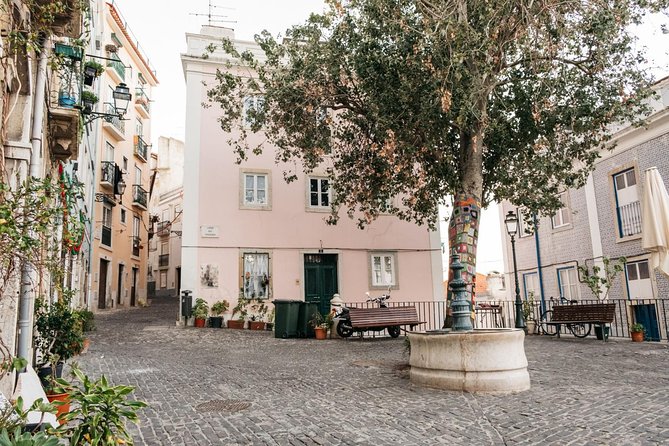
Fado’s cultural significance permeates every aspect of Portuguese society, from its deep emotional connection to its role in preserving the country’s rich heritage. Fado has played a crucial role in shaping and defining Portuguese identity, serving as a powerful expression of the nation’s collective emotions and experiences.
Through its melancholic melodies and heartfelt lyrics, Fado has the ability to transport listeners to a different time and place, evoking a sense of nostalgia and longing. It serves as a form of storytelling, allowing artists to share their personal narratives and connect with audiences on a profound level.
Fado has become an integral part of Portuguese culture, serving as a powerful reminder of the country’s history, struggles, and triumphs. It’s a testament to the resilience and spirit of the Portuguese people, and its impact on their identity can’t be overstated.
Iconic Fado Artists and Venues

One can’t discuss the world of Fado without acknowledging the iconic artists and venues that have shaped its history. These artists and venues have played a significant role in showcasing the emotional and soulful nature of Fado, and their performances have left a lasting impact on Portuguese culture.
Here are five iconic fado artists and venues that have become synonymous with the genre:
Amália Rodrigues: Known as the queen of Fado, Amália Rodrigues’s powerful and expressive voice captivated audiences worldwide.
Café Luso: A historic venue in Lisbon, Café Luso has been hosting fado performances since 1927, providing an intimate setting for authentic fado experiences.
Mariza: With her contemporary approach to fado, Mariza has brought a fresh perspective to the genre, captivating audiences with her mesmerizing performances.
Clube de Fado: Located in the heart of Alfama, Clube de Fado is a popular venue that showcases both traditional and modern fado performances, attracting locals and travelers alike.
Carlos do Carmo: Considered one of the greatest fado singers of all time, Carlos do Carmo’s heartfelt performances continue to resonate with audiences, leaving a lasting legacy in the world of fado.
Interested in history? More Lisbon historical sites we've covered
- Lisbon: Panoramic Historical Sightseeing Tour by Tuk Tuk
- Lisbon: Jewish History in Portugal Guided Walking Tour
- Lisbon: German Walking Tour About History, Culture & Events
- Lisbon: Sunset Sailing With Portuguese Wine and History
- Lisbon: Guided Tour of Historic Belém by Electric Bike
- Lisbon: 3-Hour Historic Tuk Tuk Tour
Exploring Fado in Lisbon’s Neighborhoods
Lisbon’s neighborhoods offer a captivating journey through the soulful and enchanting world of Fado. As one of Portugal’s most cherished music traditions, Fado performances in Lisbon can be found in various neighborhoods, each with its own unique atmosphere and charm.
Alfama, the oldest district of the city, is renowned for its narrow streets and intimate Fado houses, where locals and visitors gather to experience the heartfelt melodies and melancholic lyrics.
Bairro Alto, on the other hand, is known for its lively nightlife and vibrant Fado bars, where energetic performances resonate through the bustling streets.
The neighborhood of Mouraria, birthplace of Fado, is a must-visit for those seeking a more authentic and traditional experience.
Whether wandering through Alfama’s labyrinthine alleys or immersing oneself in the vibrant atmosphere of Bairro Alto, exploring Fado in Lisbon’s neighborhoods is an unforgettable journey into the heart and soul of Portuguese music.
Common Questions
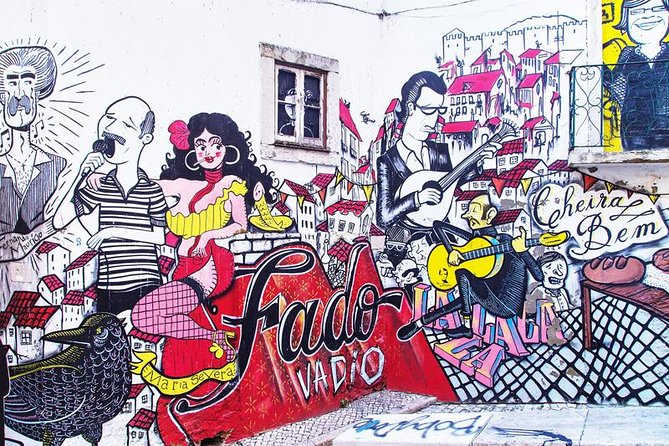
How Long Is the Lisbon Fado History Cultural Walking Tour?
The Lisbon Fado History Cultural Walking Tour lasts approximately 2.5 hours. It has a maximum group size of 12 people and there are no age restrictions, making it a great activity for everyone to enjoy.
What Is the Maximum Group Size for the Tour?
The maximum group size for the tour is not mentioned in the information provided. However, group size restrictions are often put in place to ensure a more personalized and enjoyable experience for participants.
Are There Any Age Restrictions for the Tour?
Yes, children can participate in the tour. There are no age restrictions for the Lisbon Fado History Cultural Walking Tour. It is a family-friendly experience that allows everyone to learn and enjoy the rich cultural history of Lisbon.
Are Food and Drinks Included in the Tour?
Food and drinks are not included in the tour. To experience traditional Portuguese cuisine in Lisbon, travelers should try dishes like bacalhau à brás and pasteis de nata, and drinks like port wine and ginjinha.
Is There Any Specific Dress Code for the Tour?
There is no specific dress code for the tour, but it is recommended to wear comfortable shoes and clothing. The tour focuses on the cultural significance of Lisbon Fado, allowing participants to enjoy the history and traditions of this unique musical genre.
The Sum Up
To sum it up, the Lisbon Fado History Cultural Walking Tour offers a captivating and immersive experience for travelers seeking to explore the rich cultural heritage of Fado.
With its knowledgeable guides, enchanting neighborhoods, and interactions with local musicians, this tour provides a deep understanding and appreciation for the origins and significance of this traditional Portuguese music genre.
Whether you’re a music enthusiast or simply curious about Portuguese culture, the Lisbon Fado History Cultural Walking Tour promises an unforgettable journey through the soulful melodies of Fado.
More Walking Tours in Lisbon
More Tours in Lisbon
More Tour Reviews in Lisbon
Looking for something different? Other Lisbon activities we've written about
- Lisbon Sunset Boat Tour with local Snacks & Drinks
- 4-hour Tuk Tuk Tour of Belém, City Center, and Lisbon’s Old Town
- 3-Hour Portuguese Tapas Cooking Class in Lisbon
- 2-Hour Pastel de Nata Baking Class in Lisbon
- Lisbon car tour 3 hours
- One Day Private Tour to Lisbon Beaches
- Day Trip to the Algarve: Explore Lagos and Albufeira from Lisbon
- Premium Lisbon Airport Transfer to Lisbon
- Escape Game Team Magic Theme in Lisbon
- Discover Sintra and the Atlantic Coast on an 8 Hour Private Tour
- Complete Historical City Tour with a Tuk Tuk
- Discover Lisbon in Style Private Tuk Tuk Tour
